Entrepreneurship: Small Business Management, Ventures & Impact
VerifiedAdded on 2020/10/23
|15
|4719
|239
Report
AI Summary
This report provides a comprehensive overview of entrepreneurship and small business management, covering different types of entrepreneurial ventures, their relationships, similarities, and differences. It investigates the impact of small, medium, and large businesses on the economy, with specific data and statistics illustrating the role of micro and small businesses. The report also explores the characteristics and skills of successful entrepreneurs, examining various aspects of entrepreneurial personality and linking them to personal backgrounds and experiences. Furthermore, it highlights the importance of small businesses and start-ups in generating employment and improving the standard of living, supported by statistical data analyzing the contribution of SMEs to the UK economy. The document emphasizes the critical role of SMEs in fostering innovation, competition, and economic development, providing valuable insights into the dynamics of entrepreneurship and small business management.

Entrepreneurship and Small
Business Management
Business Management
Paraphrase This Document
Need a fresh take? Get an instant paraphrase of this document with our AI Paraphraser
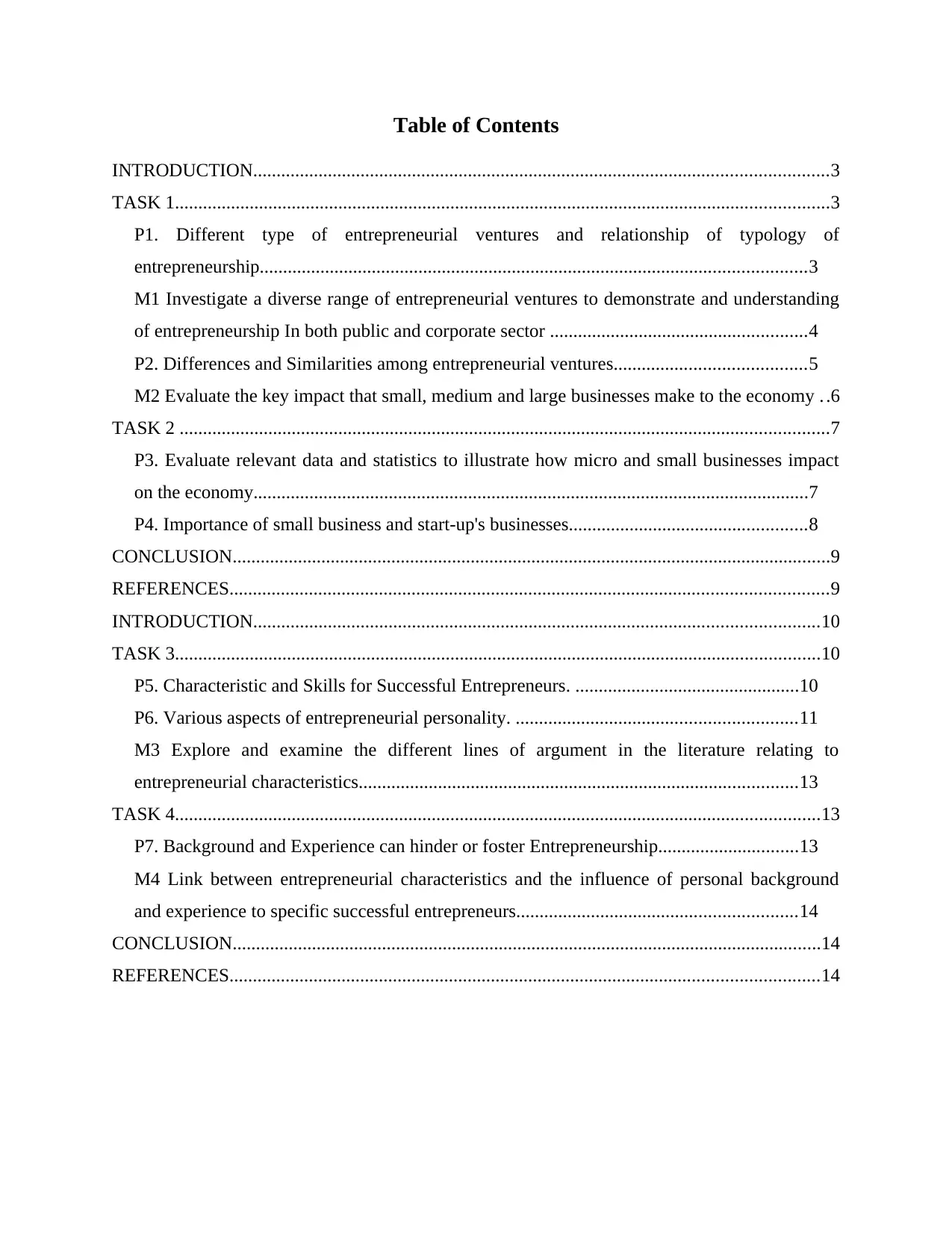
Table of Contents
INTRODUCTION...........................................................................................................................3
TASK 1............................................................................................................................................3
P1. Different type of entrepreneurial ventures and relationship of typology of
entrepreneurship.....................................................................................................................3
M1 Investigate a diverse range of entrepreneurial ventures to demonstrate and understanding
of entrepreneurship In both public and corporate sector .......................................................4
P2. Differences and Similarities among entrepreneurial ventures.........................................5
M2 Evaluate the key impact that small, medium and large businesses make to the economy . .6
TASK 2 ...........................................................................................................................................7
P3. Evaluate relevant data and statistics to illustrate how micro and small businesses impact
on the economy.......................................................................................................................7
P4. Importance of small business and start-up's businesses...................................................8
CONCLUSION................................................................................................................................9
REFERENCES................................................................................................................................9
INTRODUCTION.........................................................................................................................10
TASK 3..........................................................................................................................................10
P5. Characteristic and Skills for Successful Entrepreneurs. ................................................10
P6. Various aspects of entrepreneurial personality. ............................................................11
M3 Explore and examine the different lines of argument in the literature relating to
entrepreneurial characteristics..............................................................................................13
TASK 4..........................................................................................................................................13
P7. Background and Experience can hinder or foster Entrepreneurship..............................13
M4 Link between entrepreneurial characteristics and the influence of personal background
and experience to specific successful entrepreneurs............................................................14
CONCLUSION..............................................................................................................................14
REFERENCES..............................................................................................................................14
INTRODUCTION...........................................................................................................................3
TASK 1............................................................................................................................................3
P1. Different type of entrepreneurial ventures and relationship of typology of
entrepreneurship.....................................................................................................................3
M1 Investigate a diverse range of entrepreneurial ventures to demonstrate and understanding
of entrepreneurship In both public and corporate sector .......................................................4
P2. Differences and Similarities among entrepreneurial ventures.........................................5
M2 Evaluate the key impact that small, medium and large businesses make to the economy . .6
TASK 2 ...........................................................................................................................................7
P3. Evaluate relevant data and statistics to illustrate how micro and small businesses impact
on the economy.......................................................................................................................7
P4. Importance of small business and start-up's businesses...................................................8
CONCLUSION................................................................................................................................9
REFERENCES................................................................................................................................9
INTRODUCTION.........................................................................................................................10
TASK 3..........................................................................................................................................10
P5. Characteristic and Skills for Successful Entrepreneurs. ................................................10
P6. Various aspects of entrepreneurial personality. ............................................................11
M3 Explore and examine the different lines of argument in the literature relating to
entrepreneurial characteristics..............................................................................................13
TASK 4..........................................................................................................................................13
P7. Background and Experience can hinder or foster Entrepreneurship..............................13
M4 Link between entrepreneurial characteristics and the influence of personal background
and experience to specific successful entrepreneurs............................................................14
CONCLUSION..............................................................................................................................14
REFERENCES..............................................................................................................................14
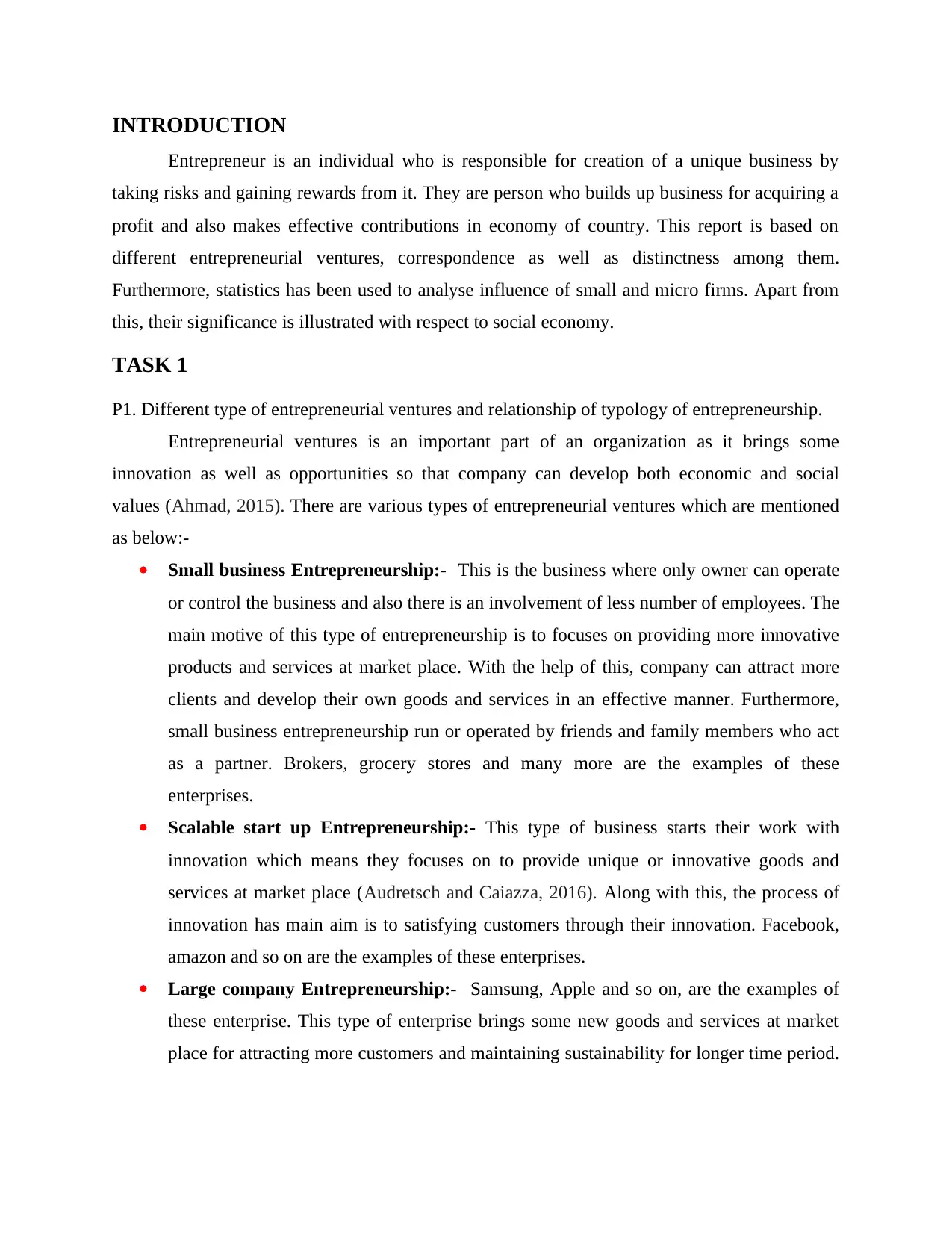
INTRODUCTION
Entrepreneur is an individual who is responsible for creation of a unique business by
taking risks and gaining rewards from it. They are person who builds up business for acquiring a
profit and also makes effective contributions in economy of country. This report is based on
different entrepreneurial ventures, correspondence as well as distinctness among them.
Furthermore, statistics has been used to analyse influence of small and micro firms. Apart from
this, their significance is illustrated with respect to social economy.
TASK 1
P1. Different type of entrepreneurial ventures and relationship of typology of entrepreneurship.
Entrepreneurial ventures is an important part of an organization as it brings some
innovation as well as opportunities so that company can develop both economic and social
values (Ahmad, 2015). There are various types of entrepreneurial ventures which are mentioned
as below:-
Small business Entrepreneurship:- This is the business where only owner can operate
or control the business and also there is an involvement of less number of employees. The
main motive of this type of entrepreneurship is to focuses on providing more innovative
products and services at market place. With the help of this, company can attract more
clients and develop their own goods and services in an effective manner. Furthermore,
small business entrepreneurship run or operated by friends and family members who act
as a partner. Brokers, grocery stores and many more are the examples of these
enterprises.
Scalable start up Entrepreneurship:- This type of business starts their work with
innovation which means they focuses on to provide unique or innovative goods and
services at market place (Audretsch and Caiazza, 2016). Along with this, the process of
innovation has main aim is to satisfying customers through their innovation. Facebook,
amazon and so on are the examples of these enterprises.
Large company Entrepreneurship:- Samsung, Apple and so on, are the examples of
these enterprise. This type of enterprise brings some new goods and services at market
place for attracting more customers and maintaining sustainability for longer time period.
Entrepreneur is an individual who is responsible for creation of a unique business by
taking risks and gaining rewards from it. They are person who builds up business for acquiring a
profit and also makes effective contributions in economy of country. This report is based on
different entrepreneurial ventures, correspondence as well as distinctness among them.
Furthermore, statistics has been used to analyse influence of small and micro firms. Apart from
this, their significance is illustrated with respect to social economy.
TASK 1
P1. Different type of entrepreneurial ventures and relationship of typology of entrepreneurship.
Entrepreneurial ventures is an important part of an organization as it brings some
innovation as well as opportunities so that company can develop both economic and social
values (Ahmad, 2015). There are various types of entrepreneurial ventures which are mentioned
as below:-
Small business Entrepreneurship:- This is the business where only owner can operate
or control the business and also there is an involvement of less number of employees. The
main motive of this type of entrepreneurship is to focuses on providing more innovative
products and services at market place. With the help of this, company can attract more
clients and develop their own goods and services in an effective manner. Furthermore,
small business entrepreneurship run or operated by friends and family members who act
as a partner. Brokers, grocery stores and many more are the examples of these
enterprises.
Scalable start up Entrepreneurship:- This type of business starts their work with
innovation which means they focuses on to provide unique or innovative goods and
services at market place (Audretsch and Caiazza, 2016). Along with this, the process of
innovation has main aim is to satisfying customers through their innovation. Facebook,
amazon and so on are the examples of these enterprises.
Large company Entrepreneurship:- Samsung, Apple and so on, are the examples of
these enterprise. This type of enterprise brings some new goods and services at market
place for attracting more customers and maintaining sustainability for longer time period.
⊘ This is a preview!⊘
Do you want full access?
Subscribe today to unlock all pages.

Trusted by 1+ million students worldwide
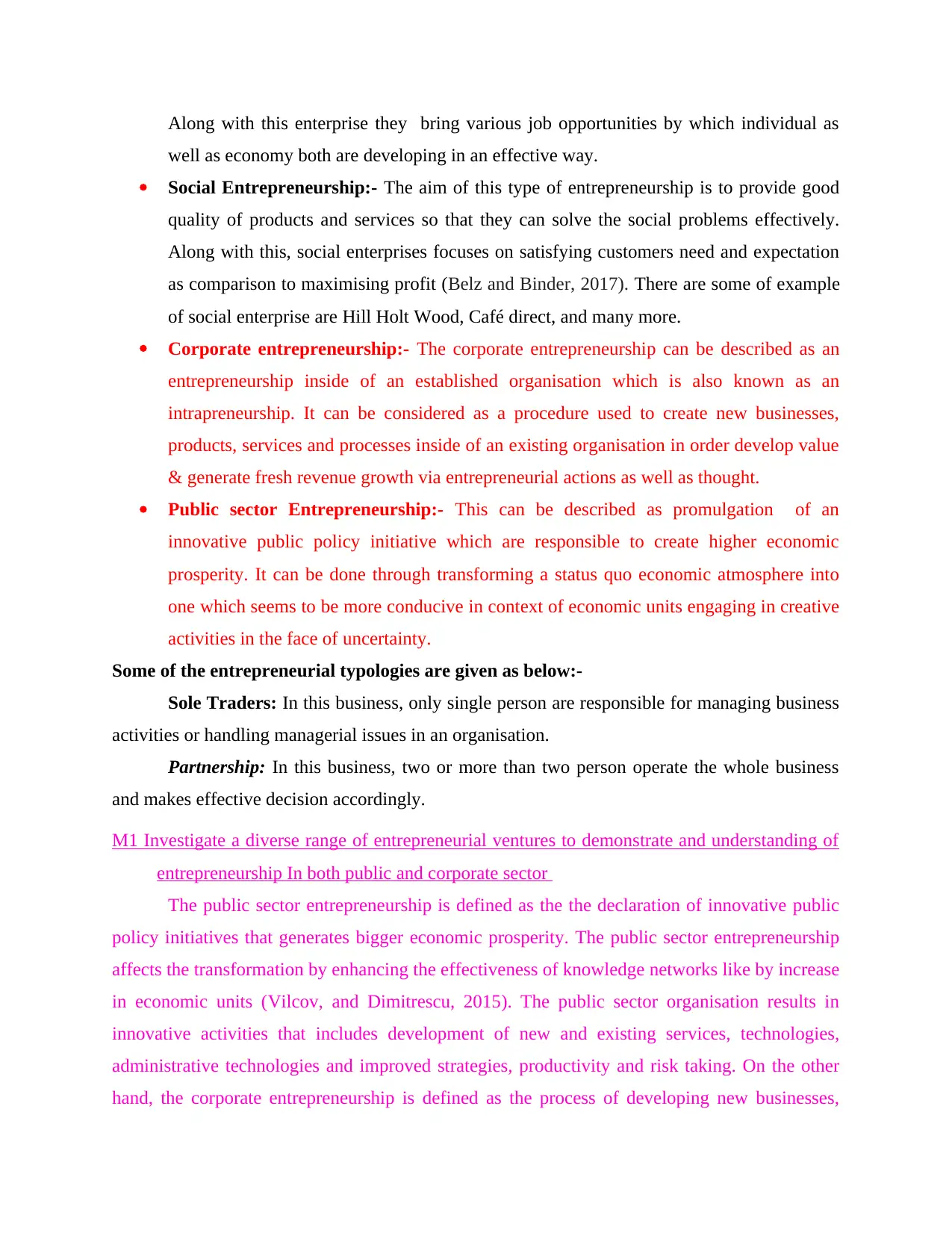
Along with this enterprise they bring various job opportunities by which individual as
well as economy both are developing in an effective way.
Social Entrepreneurship:- The aim of this type of entrepreneurship is to provide good
quality of products and services so that they can solve the social problems effectively.
Along with this, social enterprises focuses on satisfying customers need and expectation
as comparison to maximising profit (Belz and Binder, 2017). There are some of example
of social enterprise are Hill Holt Wood, Café direct, and many more.
Corporate entrepreneurship:- The corporate entrepreneurship can be described as an
entrepreneurship inside of an established organisation which is also known as an
intrapreneurship. It can be considered as a procedure used to create new businesses,
products, services and processes inside of an existing organisation in order develop value
& generate fresh revenue growth via entrepreneurial actions as well as thought.
Public sector Entrepreneurship:- This can be described as promulgation of an
innovative public policy initiative which are responsible to create higher economic
prosperity. It can be done through transforming a status quo economic atmosphere into
one which seems to be more conducive in context of economic units engaging in creative
activities in the face of uncertainty.
Some of the entrepreneurial typologies are given as below:-
Sole Traders: In this business, only single person are responsible for managing business
activities or handling managerial issues in an organisation.
Partnership: In this business, two or more than two person operate the whole business
and makes effective decision accordingly.
M1 Investigate a diverse range of entrepreneurial ventures to demonstrate and understanding of
entrepreneurship In both public and corporate sector
The public sector entrepreneurship is defined as the the declaration of innovative public
policy initiatives that generates bigger economic prosperity. The public sector entrepreneurship
affects the transformation by enhancing the effectiveness of knowledge networks like by increase
in economic units (Vilcov, and Dimitrescu, 2015). The public sector organisation results in
innovative activities that includes development of new and existing services, technologies,
administrative technologies and improved strategies, productivity and risk taking. On the other
hand, the corporate entrepreneurship is defined as the process of developing new businesses,
well as economy both are developing in an effective way.
Social Entrepreneurship:- The aim of this type of entrepreneurship is to provide good
quality of products and services so that they can solve the social problems effectively.
Along with this, social enterprises focuses on satisfying customers need and expectation
as comparison to maximising profit (Belz and Binder, 2017). There are some of example
of social enterprise are Hill Holt Wood, Café direct, and many more.
Corporate entrepreneurship:- The corporate entrepreneurship can be described as an
entrepreneurship inside of an established organisation which is also known as an
intrapreneurship. It can be considered as a procedure used to create new businesses,
products, services and processes inside of an existing organisation in order develop value
& generate fresh revenue growth via entrepreneurial actions as well as thought.
Public sector Entrepreneurship:- This can be described as promulgation of an
innovative public policy initiative which are responsible to create higher economic
prosperity. It can be done through transforming a status quo economic atmosphere into
one which seems to be more conducive in context of economic units engaging in creative
activities in the face of uncertainty.
Some of the entrepreneurial typologies are given as below:-
Sole Traders: In this business, only single person are responsible for managing business
activities or handling managerial issues in an organisation.
Partnership: In this business, two or more than two person operate the whole business
and makes effective decision accordingly.
M1 Investigate a diverse range of entrepreneurial ventures to demonstrate and understanding of
entrepreneurship In both public and corporate sector
The public sector entrepreneurship is defined as the the declaration of innovative public
policy initiatives that generates bigger economic prosperity. The public sector entrepreneurship
affects the transformation by enhancing the effectiveness of knowledge networks like by increase
in economic units (Vilcov, and Dimitrescu, 2015). The public sector organisation results in
innovative activities that includes development of new and existing services, technologies,
administrative technologies and improved strategies, productivity and risk taking. On the other
hand, the corporate entrepreneurship is defined as the process of developing new businesses,
Paraphrase This Document
Need a fresh take? Get an instant paraphrase of this document with our AI Paraphraser
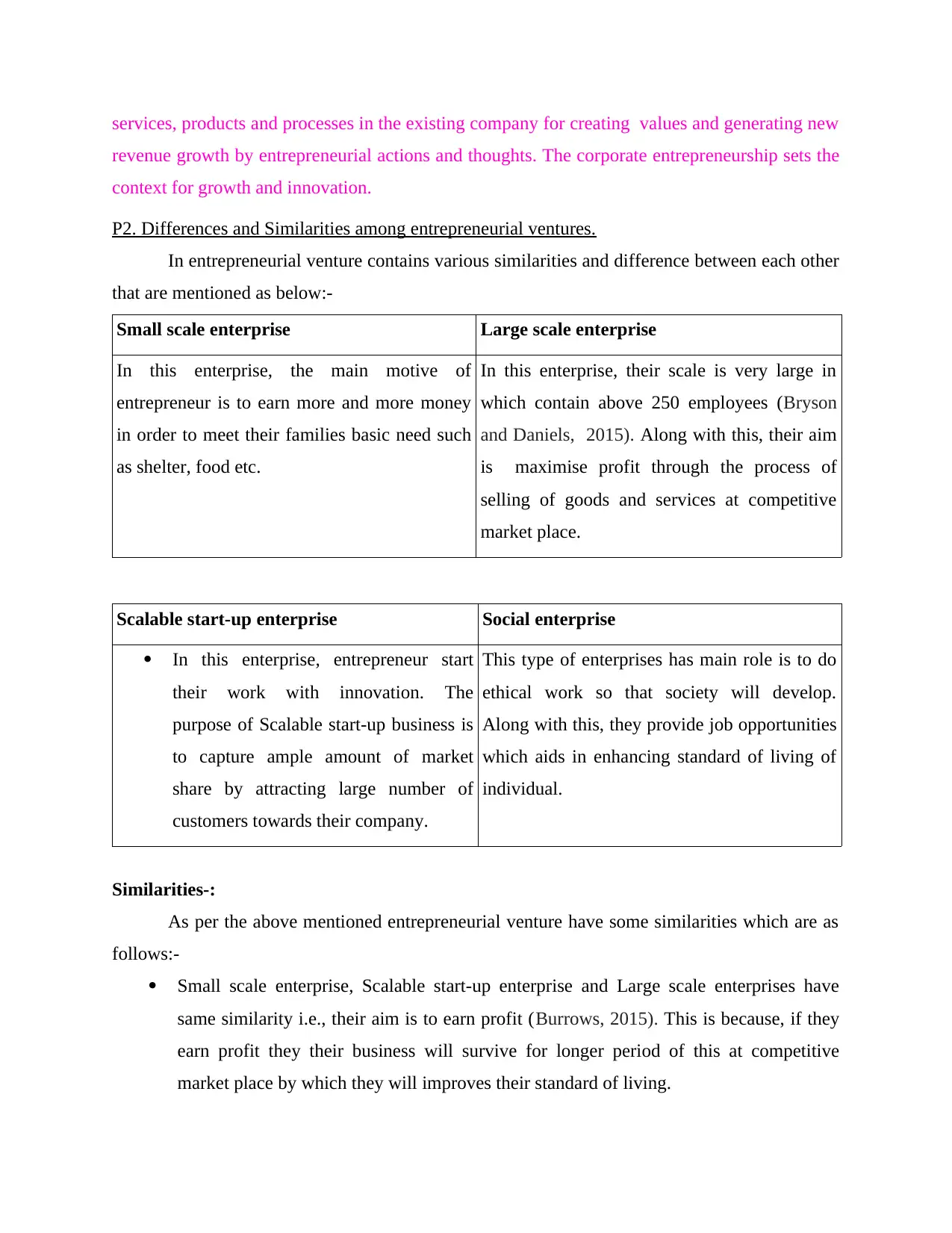
services, products and processes in the existing company for creating values and generating new
revenue growth by entrepreneurial actions and thoughts. The corporate entrepreneurship sets the
context for growth and innovation.
P2. Differences and Similarities among entrepreneurial ventures.
In entrepreneurial venture contains various similarities and difference between each other
that are mentioned as below:-
Small scale enterprise Large scale enterprise
In this enterprise, the main motive of
entrepreneur is to earn more and more money
in order to meet their families basic need such
as shelter, food etc.
In this enterprise, their scale is very large in
which contain above 250 employees (Bryson
and Daniels, 2015). Along with this, their aim
is maximise profit through the process of
selling of goods and services at competitive
market place.
Scalable start-up enterprise Social enterprise
In this enterprise, entrepreneur start
their work with innovation. The
purpose of Scalable start-up business is
to capture ample amount of market
share by attracting large number of
customers towards their company.
This type of enterprises has main role is to do
ethical work so that society will develop.
Along with this, they provide job opportunities
which aids in enhancing standard of living of
individual.
Similarities-:
As per the above mentioned entrepreneurial venture have some similarities which are as
follows:-
Small scale enterprise, Scalable start-up enterprise and Large scale enterprises have
same similarity i.e., their aim is to earn profit (Burrows, 2015). This is because, if they
earn profit they their business will survive for longer period of this at competitive
market place by which they will improves their standard of living.
revenue growth by entrepreneurial actions and thoughts. The corporate entrepreneurship sets the
context for growth and innovation.
P2. Differences and Similarities among entrepreneurial ventures.
In entrepreneurial venture contains various similarities and difference between each other
that are mentioned as below:-
Small scale enterprise Large scale enterprise
In this enterprise, the main motive of
entrepreneur is to earn more and more money
in order to meet their families basic need such
as shelter, food etc.
In this enterprise, their scale is very large in
which contain above 250 employees (Bryson
and Daniels, 2015). Along with this, their aim
is maximise profit through the process of
selling of goods and services at competitive
market place.
Scalable start-up enterprise Social enterprise
In this enterprise, entrepreneur start
their work with innovation. The
purpose of Scalable start-up business is
to capture ample amount of market
share by attracting large number of
customers towards their company.
This type of enterprises has main role is to do
ethical work so that society will develop.
Along with this, they provide job opportunities
which aids in enhancing standard of living of
individual.
Similarities-:
As per the above mentioned entrepreneurial venture have some similarities which are as
follows:-
Small scale enterprise, Scalable start-up enterprise and Large scale enterprises have
same similarity i.e., their aim is to earn profit (Burrows, 2015). This is because, if they
earn profit they their business will survive for longer period of this at competitive
market place by which they will improves their standard of living.
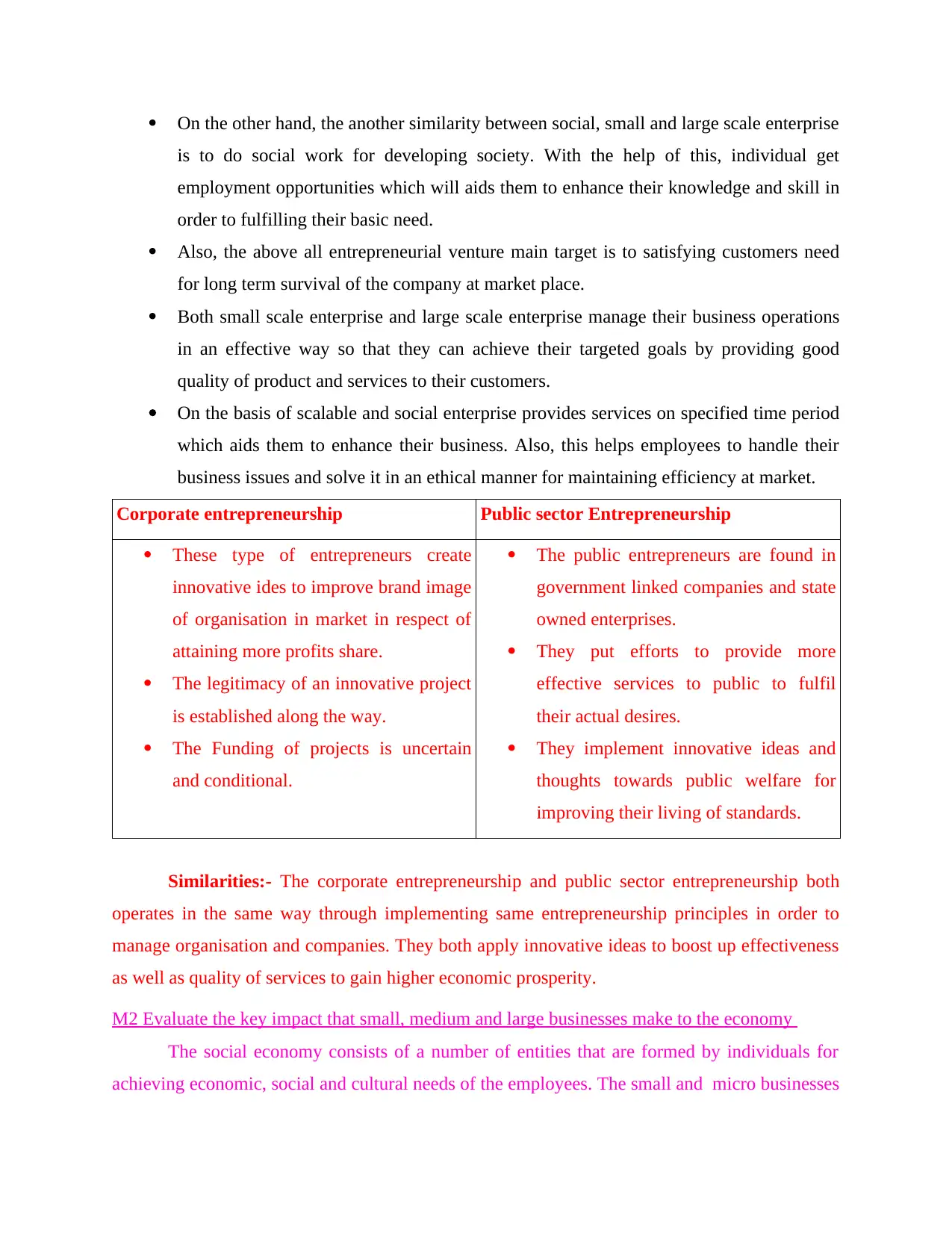
On the other hand, the another similarity between social, small and large scale enterprise
is to do social work for developing society. With the help of this, individual get
employment opportunities which will aids them to enhance their knowledge and skill in
order to fulfilling their basic need.
Also, the above all entrepreneurial venture main target is to satisfying customers need
for long term survival of the company at market place.
Both small scale enterprise and large scale enterprise manage their business operations
in an effective way so that they can achieve their targeted goals by providing good
quality of product and services to their customers.
On the basis of scalable and social enterprise provides services on specified time period
which aids them to enhance their business. Also, this helps employees to handle their
business issues and solve it in an ethical manner for maintaining efficiency at market.
Corporate entrepreneurship Public sector Entrepreneurship
These type of entrepreneurs create
innovative ides to improve brand image
of organisation in market in respect of
attaining more profits share.
The legitimacy of an innovative project
is established along the way.
The Funding of projects is uncertain
and conditional.
The public entrepreneurs are found in
government linked companies and state
owned enterprises.
They put efforts to provide more
effective services to public to fulfil
their actual desires.
They implement innovative ideas and
thoughts towards public welfare for
improving their living of standards.
Similarities:- The corporate entrepreneurship and public sector entrepreneurship both
operates in the same way through implementing same entrepreneurship principles in order to
manage organisation and companies. They both apply innovative ideas to boost up effectiveness
as well as quality of services to gain higher economic prosperity.
M2 Evaluate the key impact that small, medium and large businesses make to the economy
The social economy consists of a number of entities that are formed by individuals for
achieving economic, social and cultural needs of the employees. The small and micro businesses
is to do social work for developing society. With the help of this, individual get
employment opportunities which will aids them to enhance their knowledge and skill in
order to fulfilling their basic need.
Also, the above all entrepreneurial venture main target is to satisfying customers need
for long term survival of the company at market place.
Both small scale enterprise and large scale enterprise manage their business operations
in an effective way so that they can achieve their targeted goals by providing good
quality of product and services to their customers.
On the basis of scalable and social enterprise provides services on specified time period
which aids them to enhance their business. Also, this helps employees to handle their
business issues and solve it in an ethical manner for maintaining efficiency at market.
Corporate entrepreneurship Public sector Entrepreneurship
These type of entrepreneurs create
innovative ides to improve brand image
of organisation in market in respect of
attaining more profits share.
The legitimacy of an innovative project
is established along the way.
The Funding of projects is uncertain
and conditional.
The public entrepreneurs are found in
government linked companies and state
owned enterprises.
They put efforts to provide more
effective services to public to fulfil
their actual desires.
They implement innovative ideas and
thoughts towards public welfare for
improving their living of standards.
Similarities:- The corporate entrepreneurship and public sector entrepreneurship both
operates in the same way through implementing same entrepreneurship principles in order to
manage organisation and companies. They both apply innovative ideas to boost up effectiveness
as well as quality of services to gain higher economic prosperity.
M2 Evaluate the key impact that small, medium and large businesses make to the economy
The social economy consists of a number of entities that are formed by individuals for
achieving economic, social and cultural needs of the employees. The small and micro businesses
⊘ This is a preview!⊘
Do you want full access?
Subscribe today to unlock all pages.

Trusted by 1+ million students worldwide
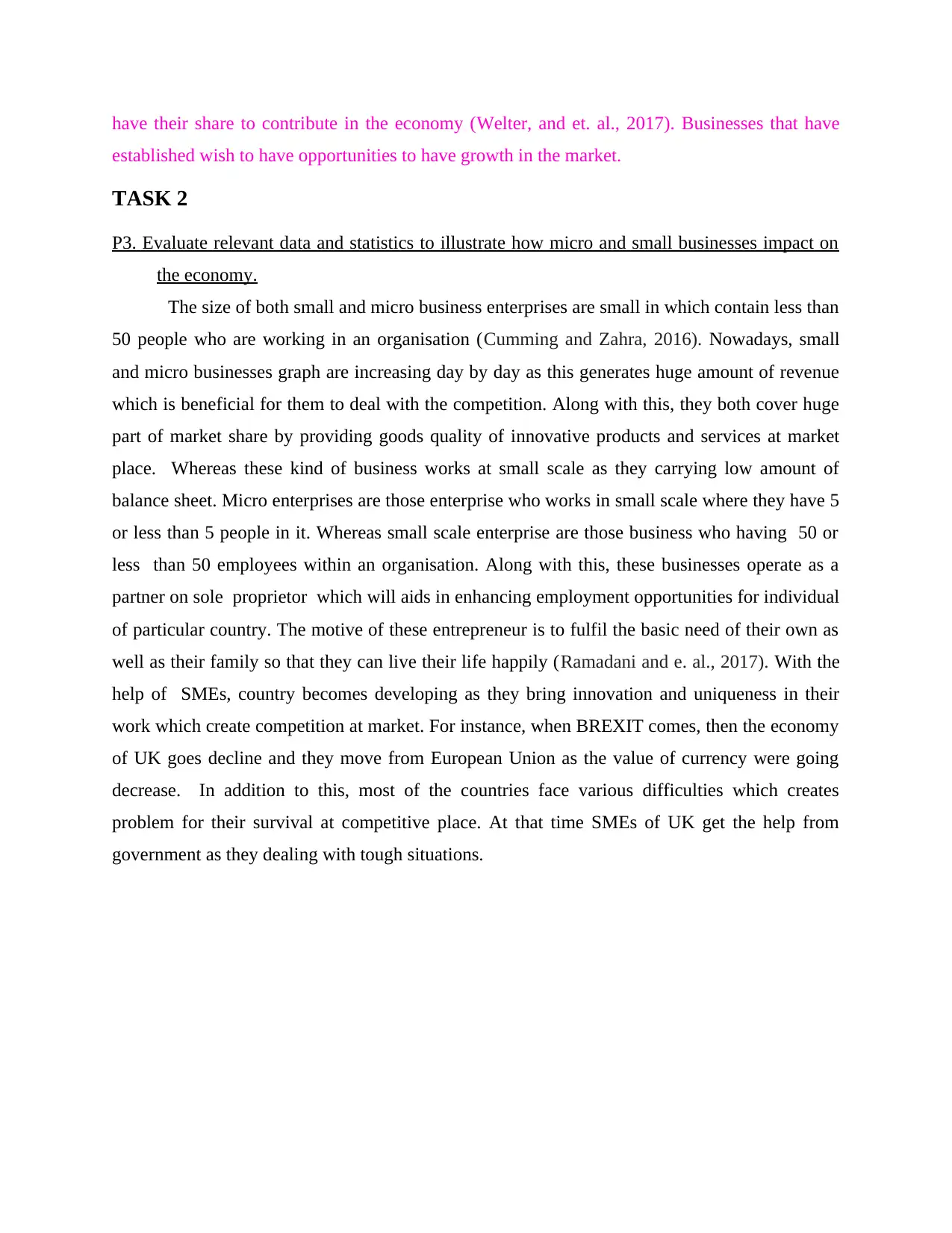
have their share to contribute in the economy (Welter, and et. al., 2017). Businesses that have
established wish to have opportunities to have growth in the market.
TASK 2
P3. Evaluate relevant data and statistics to illustrate how micro and small businesses impact on
the economy.
The size of both small and micro business enterprises are small in which contain less than
50 people who are working in an organisation (Cumming and Zahra, 2016). Nowadays, small
and micro businesses graph are increasing day by day as this generates huge amount of revenue
which is beneficial for them to deal with the competition. Along with this, they both cover huge
part of market share by providing goods quality of innovative products and services at market
place. Whereas these kind of business works at small scale as they carrying low amount of
balance sheet. Micro enterprises are those enterprise who works in small scale where they have 5
or less than 5 people in it. Whereas small scale enterprise are those business who having 50 or
less than 50 employees within an organisation. Along with this, these businesses operate as a
partner on sole proprietor which will aids in enhancing employment opportunities for individual
of particular country. The motive of these entrepreneur is to fulfil the basic need of their own as
well as their family so that they can live their life happily (Ramadani and e. al., 2017). With the
help of SMEs, country becomes developing as they bring innovation and uniqueness in their
work which create competition at market. For instance, when BREXIT comes, then the economy
of UK goes decline and they move from European Union as the value of currency were going
decrease. In addition to this, most of the countries face various difficulties which creates
problem for their survival at competitive place. At that time SMEs of UK get the help from
government as they dealing with tough situations.
established wish to have opportunities to have growth in the market.
TASK 2
P3. Evaluate relevant data and statistics to illustrate how micro and small businesses impact on
the economy.
The size of both small and micro business enterprises are small in which contain less than
50 people who are working in an organisation (Cumming and Zahra, 2016). Nowadays, small
and micro businesses graph are increasing day by day as this generates huge amount of revenue
which is beneficial for them to deal with the competition. Along with this, they both cover huge
part of market share by providing goods quality of innovative products and services at market
place. Whereas these kind of business works at small scale as they carrying low amount of
balance sheet. Micro enterprises are those enterprise who works in small scale where they have 5
or less than 5 people in it. Whereas small scale enterprise are those business who having 50 or
less than 50 employees within an organisation. Along with this, these businesses operate as a
partner on sole proprietor which will aids in enhancing employment opportunities for individual
of particular country. The motive of these entrepreneur is to fulfil the basic need of their own as
well as their family so that they can live their life happily (Ramadani and e. al., 2017). With the
help of SMEs, country becomes developing as they bring innovation and uniqueness in their
work which create competition at market. For instance, when BREXIT comes, then the economy
of UK goes decline and they move from European Union as the value of currency were going
decrease. In addition to this, most of the countries face various difficulties which creates
problem for their survival at competitive place. At that time SMEs of UK get the help from
government as they dealing with tough situations.
Paraphrase This Document
Need a fresh take? Get an instant paraphrase of this document with our AI Paraphraser
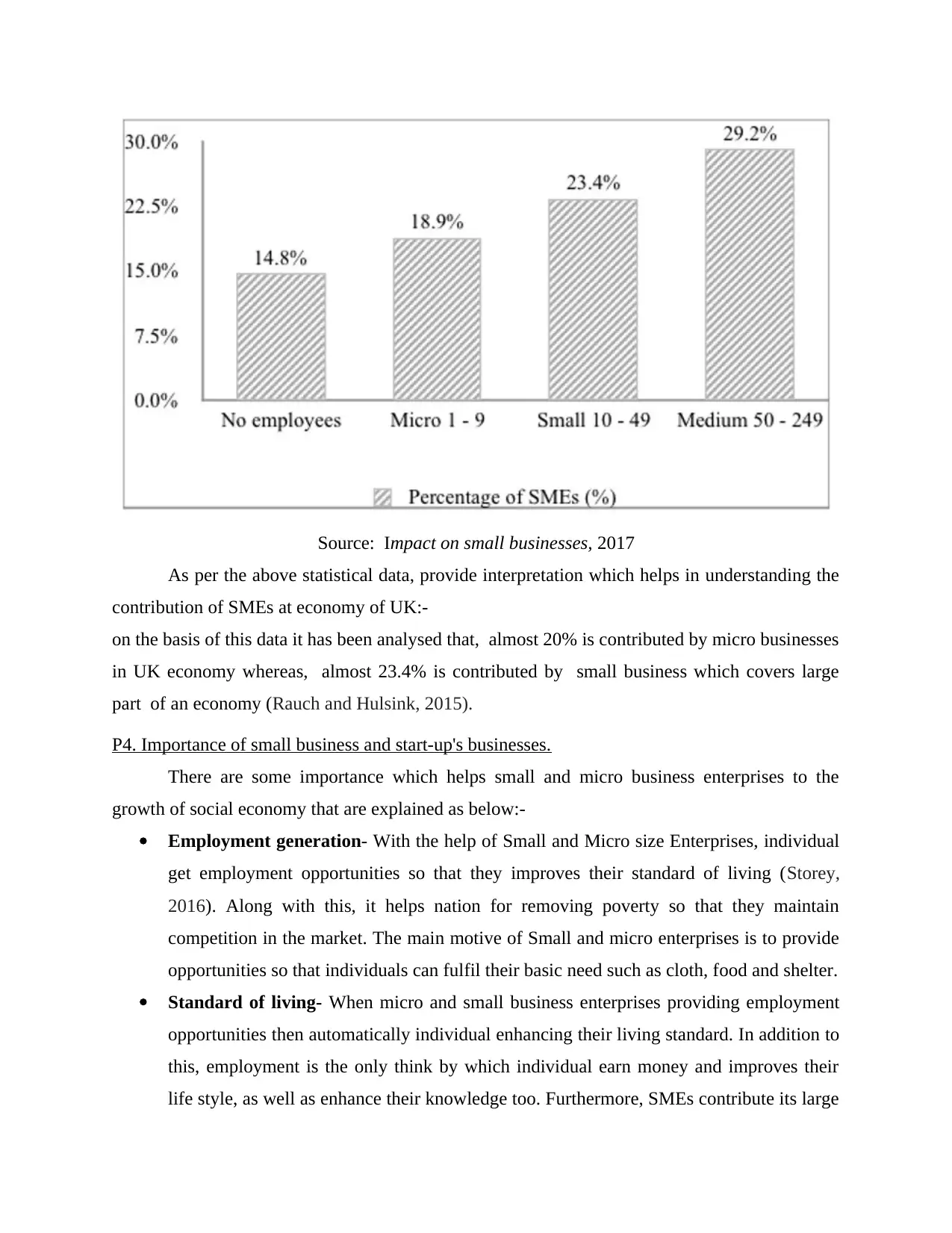
Source: Impact on small businesses, 2017
As per the above statistical data, provide interpretation which helps in understanding the
contribution of SMEs at economy of UK:-
on the basis of this data it has been analysed that, almost 20% is contributed by micro businesses
in UK economy whereas, almost 23.4% is contributed by small business which covers large
part of an economy (Rauch and Hulsink, 2015).
P4. Importance of small business and start-up's businesses.
There are some importance which helps small and micro business enterprises to the
growth of social economy that are explained as below:-
Employment generation- With the help of Small and Micro size Enterprises, individual
get employment opportunities so that they improves their standard of living (Storey,
2016). Along with this, it helps nation for removing poverty so that they maintain
competition in the market. The main motive of Small and micro enterprises is to provide
opportunities so that individuals can fulfil their basic need such as cloth, food and shelter.
Standard of living- When micro and small business enterprises providing employment
opportunities then automatically individual enhancing their living standard. In addition to
this, employment is the only think by which individual earn money and improves their
life style, as well as enhance their knowledge too. Furthermore, SMEs contribute its large
As per the above statistical data, provide interpretation which helps in understanding the
contribution of SMEs at economy of UK:-
on the basis of this data it has been analysed that, almost 20% is contributed by micro businesses
in UK economy whereas, almost 23.4% is contributed by small business which covers large
part of an economy (Rauch and Hulsink, 2015).
P4. Importance of small business and start-up's businesses.
There are some importance which helps small and micro business enterprises to the
growth of social economy that are explained as below:-
Employment generation- With the help of Small and Micro size Enterprises, individual
get employment opportunities so that they improves their standard of living (Storey,
2016). Along with this, it helps nation for removing poverty so that they maintain
competition in the market. The main motive of Small and micro enterprises is to provide
opportunities so that individuals can fulfil their basic need such as cloth, food and shelter.
Standard of living- When micro and small business enterprises providing employment
opportunities then automatically individual enhancing their living standard. In addition to
this, employment is the only think by which individual earn money and improves their
life style, as well as enhance their knowledge too. Furthermore, SMEs contribute its large
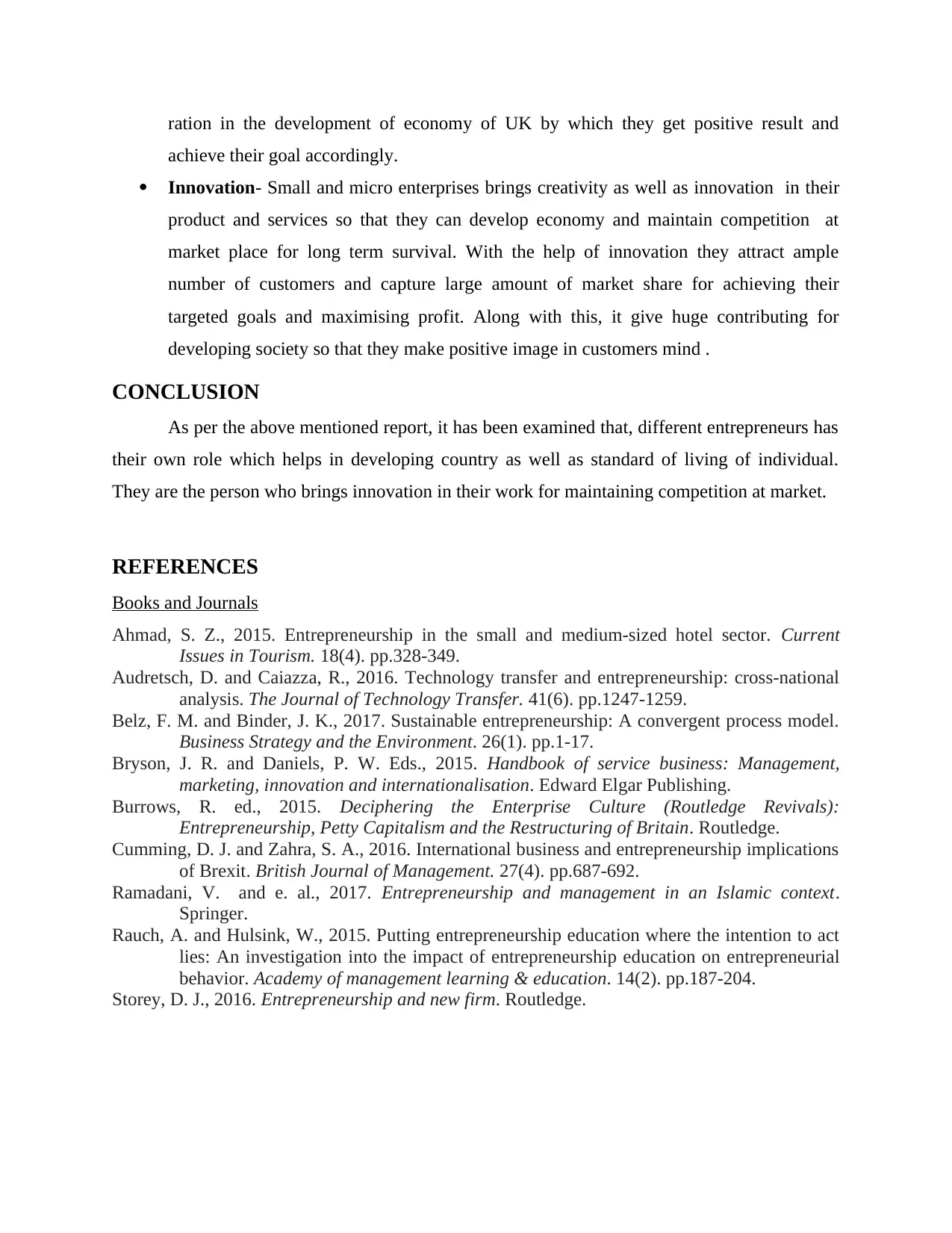
ration in the development of economy of UK by which they get positive result and
achieve their goal accordingly.
Innovation- Small and micro enterprises brings creativity as well as innovation in their
product and services so that they can develop economy and maintain competition at
market place for long term survival. With the help of innovation they attract ample
number of customers and capture large amount of market share for achieving their
targeted goals and maximising profit. Along with this, it give huge contributing for
developing society so that they make positive image in customers mind .
CONCLUSION
As per the above mentioned report, it has been examined that, different entrepreneurs has
their own role which helps in developing country as well as standard of living of individual.
They are the person who brings innovation in their work for maintaining competition at market.
REFERENCES
Books and Journals
Ahmad, S. Z., 2015. Entrepreneurship in the small and medium-sized hotel sector. Current
Issues in Tourism. 18(4). pp.328-349.
Audretsch, D. and Caiazza, R., 2016. Technology transfer and entrepreneurship: cross-national
analysis. The Journal of Technology Transfer. 41(6). pp.1247-1259.
Belz, F. M. and Binder, J. K., 2017. Sustainable entrepreneurship: A convergent process model.
Business Strategy and the Environment. 26(1). pp.1-17.
Bryson, J. R. and Daniels, P. W. Eds., 2015. Handbook of service business: Management,
marketing, innovation and internationalisation. Edward Elgar Publishing.
Burrows, R. ed., 2015. Deciphering the Enterprise Culture (Routledge Revivals):
Entrepreneurship, Petty Capitalism and the Restructuring of Britain. Routledge.
Cumming, D. J. and Zahra, S. A., 2016. International business and entrepreneurship implications
of Brexit. British Journal of Management. 27(4). pp.687-692.
Ramadani, V. and e. al., 2017. Entrepreneurship and management in an Islamic context.
Springer.
Rauch, A. and Hulsink, W., 2015. Putting entrepreneurship education where the intention to act
lies: An investigation into the impact of entrepreneurship education on entrepreneurial
behavior. Academy of management learning & education. 14(2). pp.187-204.
Storey, D. J., 2016. Entrepreneurship and new firm. Routledge.
achieve their goal accordingly.
Innovation- Small and micro enterprises brings creativity as well as innovation in their
product and services so that they can develop economy and maintain competition at
market place for long term survival. With the help of innovation they attract ample
number of customers and capture large amount of market share for achieving their
targeted goals and maximising profit. Along with this, it give huge contributing for
developing society so that they make positive image in customers mind .
CONCLUSION
As per the above mentioned report, it has been examined that, different entrepreneurs has
their own role which helps in developing country as well as standard of living of individual.
They are the person who brings innovation in their work for maintaining competition at market.
REFERENCES
Books and Journals
Ahmad, S. Z., 2015. Entrepreneurship in the small and medium-sized hotel sector. Current
Issues in Tourism. 18(4). pp.328-349.
Audretsch, D. and Caiazza, R., 2016. Technology transfer and entrepreneurship: cross-national
analysis. The Journal of Technology Transfer. 41(6). pp.1247-1259.
Belz, F. M. and Binder, J. K., 2017. Sustainable entrepreneurship: A convergent process model.
Business Strategy and the Environment. 26(1). pp.1-17.
Bryson, J. R. and Daniels, P. W. Eds., 2015. Handbook of service business: Management,
marketing, innovation and internationalisation. Edward Elgar Publishing.
Burrows, R. ed., 2015. Deciphering the Enterprise Culture (Routledge Revivals):
Entrepreneurship, Petty Capitalism and the Restructuring of Britain. Routledge.
Cumming, D. J. and Zahra, S. A., 2016. International business and entrepreneurship implications
of Brexit. British Journal of Management. 27(4). pp.687-692.
Ramadani, V. and e. al., 2017. Entrepreneurship and management in an Islamic context.
Springer.
Rauch, A. and Hulsink, W., 2015. Putting entrepreneurship education where the intention to act
lies: An investigation into the impact of entrepreneurship education on entrepreneurial
behavior. Academy of management learning & education. 14(2). pp.187-204.
Storey, D. J., 2016. Entrepreneurship and new firm. Routledge.
⊘ This is a preview!⊘
Do you want full access?
Subscribe today to unlock all pages.

Trusted by 1+ million students worldwide
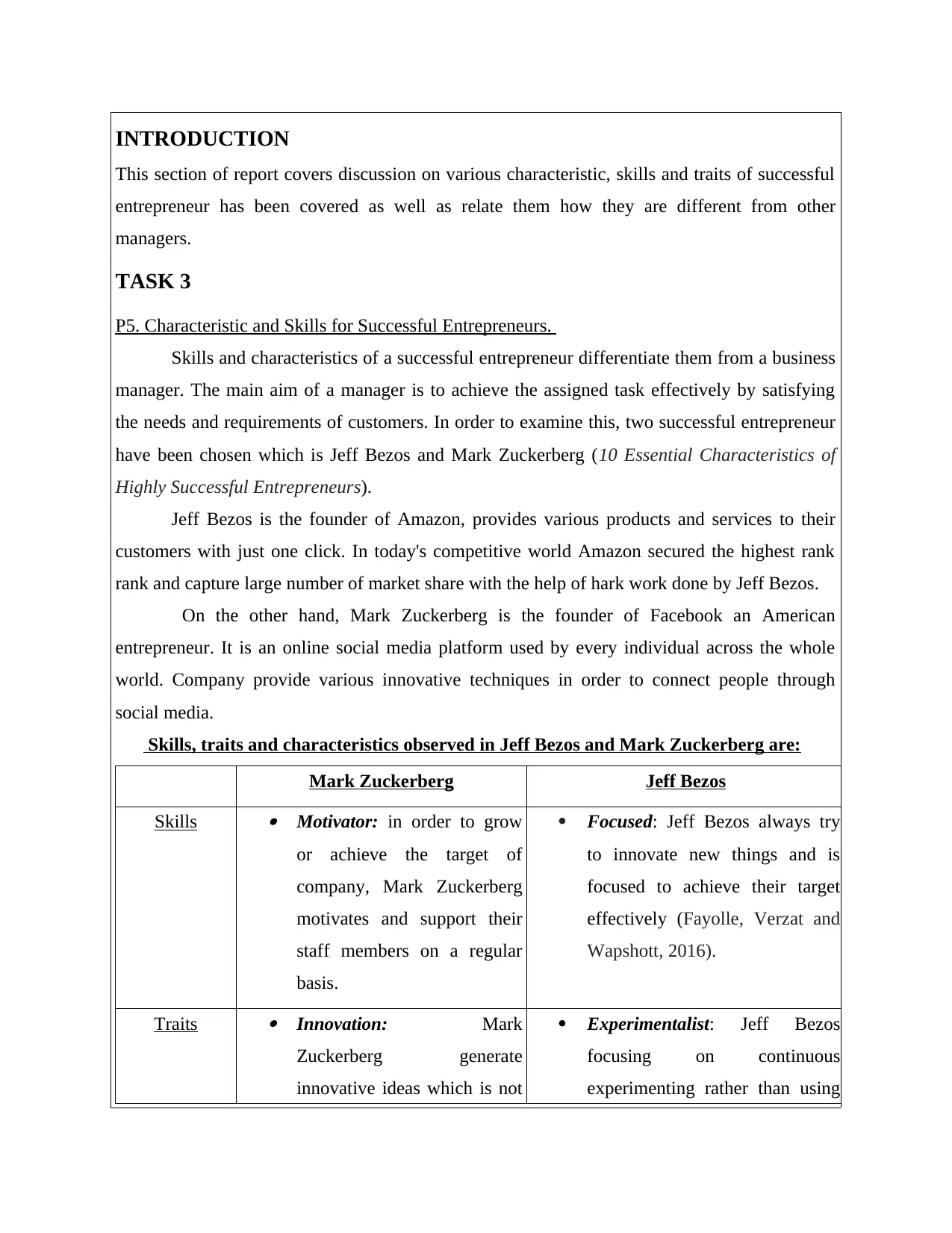
INTRODUCTION
This section of report covers discussion on various characteristic, skills and traits of successful
entrepreneur has been covered as well as relate them how they are different from other
managers.
TASK 3
P5. Characteristic and Skills for Successful Entrepreneurs.
Skills and characteristics of a successful entrepreneur differentiate them from a business
manager. The main aim of a manager is to achieve the assigned task effectively by satisfying
the needs and requirements of customers. In order to examine this, two successful entrepreneur
have been chosen which is Jeff Bezos and Mark Zuckerberg (10 Essential Characteristics of
Highly Successful Entrepreneurs).
Jeff Bezos is the founder of Amazon, provides various products and services to their
customers with just one click. In today's competitive world Amazon secured the highest rank
rank and capture large number of market share with the help of hark work done by Jeff Bezos.
On the other hand, Mark Zuckerberg is the founder of Facebook an American
entrepreneur. It is an online social media platform used by every individual across the whole
world. Company provide various innovative techniques in order to connect people through
social media.
Skills, traits and characteristics observed in Jeff Bezos and Mark Zuckerberg are:
Mark Zuckerberg Jeff Bezos
Skills
Motivator: in order to grow
or achieve the target of
company, Mark Zuckerberg
motivates and support their
staff members on a regular
basis.
Focused: Jeff Bezos always try
to innovate new things and is
focused to achieve their target
effectively (Fayolle, Verzat and
Wapshott, 2016).
Traits
Innovation: Mark
Zuckerberg generate
innovative ideas which is not
Experimentalist: Jeff Bezos
focusing on continuous
experimenting rather than using
This section of report covers discussion on various characteristic, skills and traits of successful
entrepreneur has been covered as well as relate them how they are different from other
managers.
TASK 3
P5. Characteristic and Skills for Successful Entrepreneurs.
Skills and characteristics of a successful entrepreneur differentiate them from a business
manager. The main aim of a manager is to achieve the assigned task effectively by satisfying
the needs and requirements of customers. In order to examine this, two successful entrepreneur
have been chosen which is Jeff Bezos and Mark Zuckerberg (10 Essential Characteristics of
Highly Successful Entrepreneurs).
Jeff Bezos is the founder of Amazon, provides various products and services to their
customers with just one click. In today's competitive world Amazon secured the highest rank
rank and capture large number of market share with the help of hark work done by Jeff Bezos.
On the other hand, Mark Zuckerberg is the founder of Facebook an American
entrepreneur. It is an online social media platform used by every individual across the whole
world. Company provide various innovative techniques in order to connect people through
social media.
Skills, traits and characteristics observed in Jeff Bezos and Mark Zuckerberg are:
Mark Zuckerberg Jeff Bezos
Skills
Motivator: in order to grow
or achieve the target of
company, Mark Zuckerberg
motivates and support their
staff members on a regular
basis.
Focused: Jeff Bezos always try
to innovate new things and is
focused to achieve their target
effectively (Fayolle, Verzat and
Wapshott, 2016).
Traits
Innovation: Mark
Zuckerberg generate
innovative ideas which is not
Experimentalist: Jeff Bezos
focusing on continuous
experimenting rather than using
Paraphrase This Document
Need a fresh take? Get an instant paraphrase of this document with our AI Paraphraser
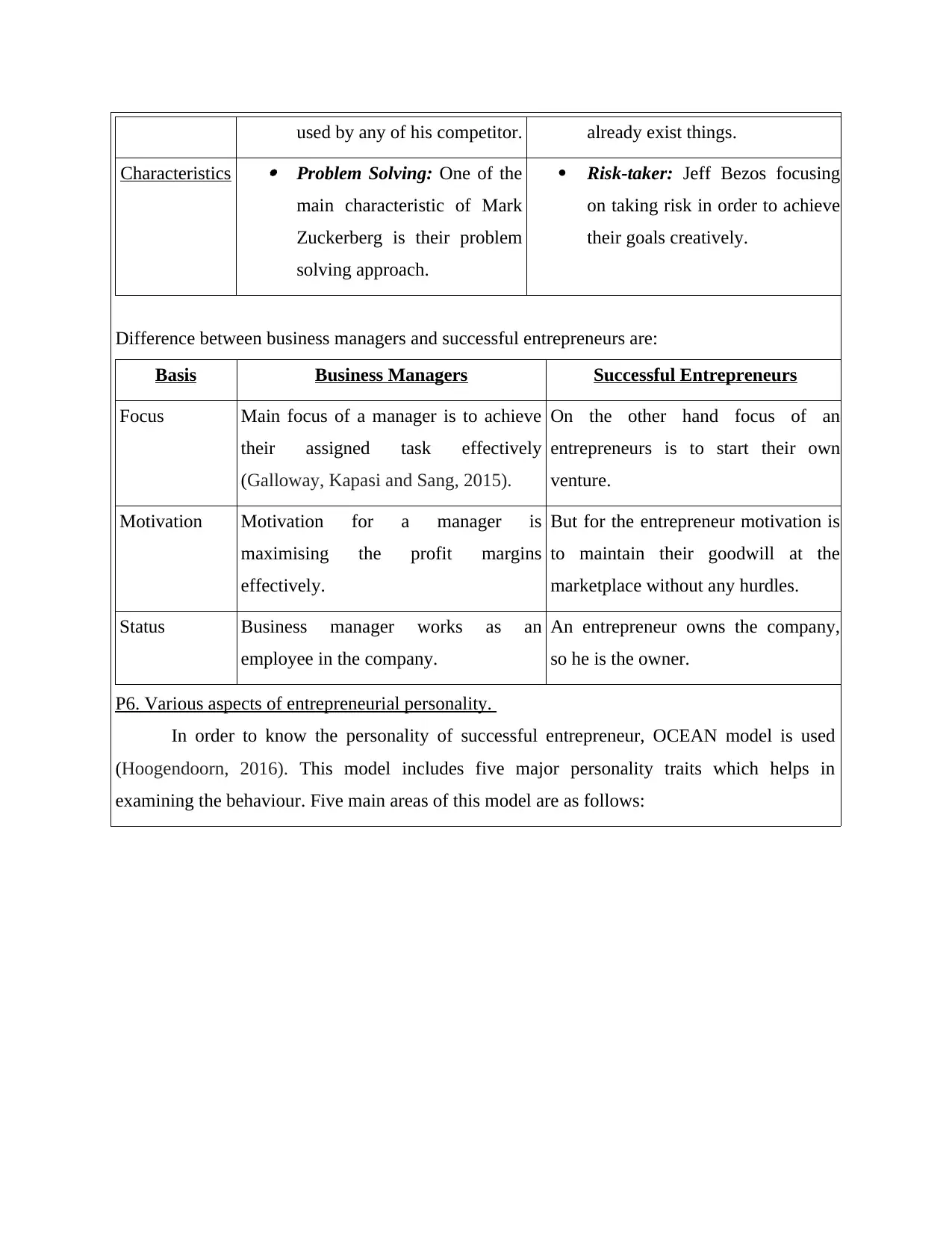
used by any of his competitor. already exist things.
Characteristics
Problem Solving: One of the
main characteristic of Mark
Zuckerberg is their problem
solving approach.
Risk-taker: Jeff Bezos focusing
on taking risk in order to achieve
their goals creatively.
Difference between business managers and successful entrepreneurs are:
Basis Business Managers Successful Entrepreneurs
Focus Main focus of a manager is to achieve
their assigned task effectively
(Galloway, Kapasi and Sang, 2015).
On the other hand focus of an
entrepreneurs is to start their own
venture.
Motivation Motivation for a manager is
maximising the profit margins
effectively.
But for the entrepreneur motivation is
to maintain their goodwill at the
marketplace without any hurdles.
Status Business manager works as an
employee in the company.
An entrepreneur owns the company,
so he is the owner.
P6. Various aspects of entrepreneurial personality.
In order to know the personality of successful entrepreneur, OCEAN model is used
(Hoogendoorn, 2016). This model includes five major personality traits which helps in
examining the behaviour. Five main areas of this model are as follows:
Characteristics
Problem Solving: One of the
main characteristic of Mark
Zuckerberg is their problem
solving approach.
Risk-taker: Jeff Bezos focusing
on taking risk in order to achieve
their goals creatively.
Difference between business managers and successful entrepreneurs are:
Basis Business Managers Successful Entrepreneurs
Focus Main focus of a manager is to achieve
their assigned task effectively
(Galloway, Kapasi and Sang, 2015).
On the other hand focus of an
entrepreneurs is to start their own
venture.
Motivation Motivation for a manager is
maximising the profit margins
effectively.
But for the entrepreneur motivation is
to maintain their goodwill at the
marketplace without any hurdles.
Status Business manager works as an
employee in the company.
An entrepreneur owns the company,
so he is the owner.
P6. Various aspects of entrepreneurial personality.
In order to know the personality of successful entrepreneur, OCEAN model is used
(Hoogendoorn, 2016). This model includes five major personality traits which helps in
examining the behaviour. Five main areas of this model are as follows:
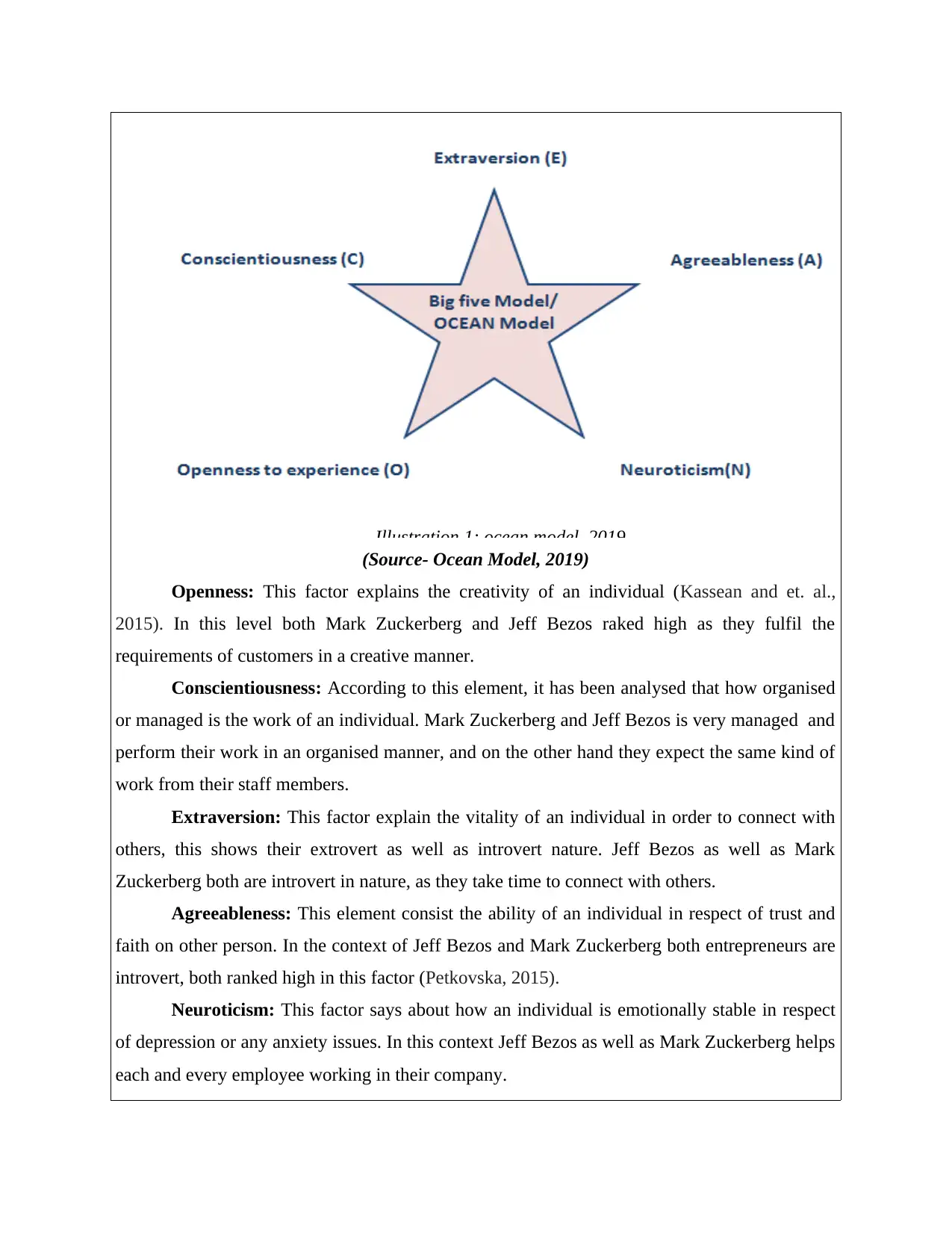
(Source- Ocean Model, 2019)
Openness: This factor explains the creativity of an individual (Kassean and et. al.,
2015). In this level both Mark Zuckerberg and Jeff Bezos raked high as they fulfil the
requirements of customers in a creative manner.
Conscientiousness: According to this element, it has been analysed that how organised
or managed is the work of an individual. Mark Zuckerberg and Jeff Bezos is very managed and
perform their work in an organised manner, and on the other hand they expect the same kind of
work from their staff members.
Extraversion: This factor explain the vitality of an individual in order to connect with
others, this shows their extrovert as well as introvert nature. Jeff Bezos as well as Mark
Zuckerberg both are introvert in nature, as they take time to connect with others.
Agreeableness: This element consist the ability of an individual in respect of trust and
faith on other person. In the context of Jeff Bezos and Mark Zuckerberg both entrepreneurs are
introvert, both ranked high in this factor (Petkovska, 2015).
Neuroticism: This factor says about how an individual is emotionally stable in respect
of depression or any anxiety issues. In this context Jeff Bezos as well as Mark Zuckerberg helps
each and every employee working in their company.
Illustration 1: ocean model, 2019
Openness: This factor explains the creativity of an individual (Kassean and et. al.,
2015). In this level both Mark Zuckerberg and Jeff Bezos raked high as they fulfil the
requirements of customers in a creative manner.
Conscientiousness: According to this element, it has been analysed that how organised
or managed is the work of an individual. Mark Zuckerberg and Jeff Bezos is very managed and
perform their work in an organised manner, and on the other hand they expect the same kind of
work from their staff members.
Extraversion: This factor explain the vitality of an individual in order to connect with
others, this shows their extrovert as well as introvert nature. Jeff Bezos as well as Mark
Zuckerberg both are introvert in nature, as they take time to connect with others.
Agreeableness: This element consist the ability of an individual in respect of trust and
faith on other person. In the context of Jeff Bezos and Mark Zuckerberg both entrepreneurs are
introvert, both ranked high in this factor (Petkovska, 2015).
Neuroticism: This factor says about how an individual is emotionally stable in respect
of depression or any anxiety issues. In this context Jeff Bezos as well as Mark Zuckerberg helps
each and every employee working in their company.
Illustration 1: ocean model, 2019
⊘ This is a preview!⊘
Do you want full access?
Subscribe today to unlock all pages.

Trusted by 1+ million students worldwide
1 out of 15
Related Documents
Your All-in-One AI-Powered Toolkit for Academic Success.
+13062052269
info@desklib.com
Available 24*7 on WhatsApp / Email
![[object Object]](/_next/static/media/star-bottom.7253800d.svg)
Unlock your academic potential
Copyright © 2020–2026 A2Z Services. All Rights Reserved. Developed and managed by ZUCOL.





